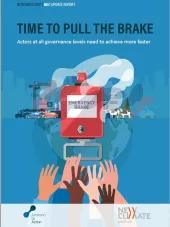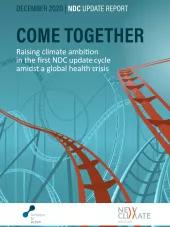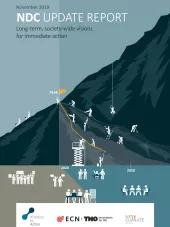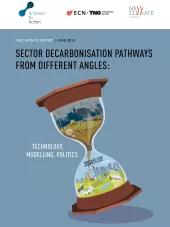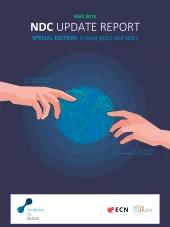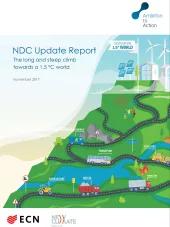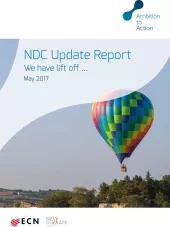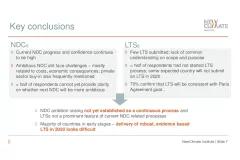The NDC Update Report tracks the progress on the implementation of Nationally Determined Contributions (NDCs) to the Paris Agreement. The theme of this edition is "Ambition": We look ahead and explore whether governments are ready for the next round of pledges and where support and preparation could focus.
Executive summary:
In December 2018, two years on from the ratification of the Paris Agreement, and two years from the first call for more ambitious pledges, the international community is cautiously observing collective efforts to reduce emissions. The IPCC report Global Warming of 1.5oC concludes that staying well below two degrees is still within reach, but time is running out and (very) deep emission reductions are needed in the coming decades. There are numerous positive initiatives in support of the Paris Agreement, but it has also become clear that the initial NDCs, often hastily compiled and hardly scrutinised, are insufficient to keep emissions in check. We depend on the ratcheting mechanism of the Paris Agreement, also known as the ambition mechanism, to put us on track. Ambition raising of the level required is a huge challenge, because of the technological and financial resources need to deliver Paris Agreement consistent ambition, but also because of the societal transformation that will be required across all sectors.
The theme of this report is Ambition: We look ahead and explore whether governments are ready for the next round of pledges and where support and preparation could focus. The report builds on our survey of 92 policymakers and experts involved in NDC planning and implementation, and interviews and discussions with a number of experienced international experts.
Looking at the results of the survey, three observations stand out. First, perceived progress and confidence around NDC implementation continues to be high. Second, it seems that long-term strategies do not yet feature prominently in NDC planning practices, leaving stakeholders without a clear understanding of the longer-term implications of plausible future transition pathways. Third, it is doubtful whether ambition raising is really seen as a continuous process, which presents the risk that new and updated NDCs will not be ambitious and/ or credible enough.
This report argues that so far, too much of the focus of governments and international organisations has been on achieving the first NDC and not enough on investigating and planning for deep emissions reductions compatible with the Paris Agreement’s long-term goals. The Paris Agreement requires much more substantial action than is needed for reaching the targets of the first NDC: all countries will have to move to net zero emissions in the coming decades. This has major consequences for sector planning and national development planning, and calls for continuous dialogue with stakeholders; both within and across sectors.
Establishing a long-term strategy and vision on sector transformation can help stakeholders to get a clearer understanding of the transition pathway ahead. It can help to structure and resolve the challenges we find in the survey: identifying actions, creating attractive investment opportunities, raising finance, and guiding support. Moreover, a strategy can provide a longer-term perspective for NDC ambition raising, making it more predictable. There are pitfalls though: developing a robust longterm strategy is not an easy task and may divert resources and attention away from short-term concrete and politically attractive actions, towards longer- term and more abstract goals.
Creating a longer-term perspective for NDC implementation raises a number of interesting questions and topic areas to explore in the coming two years and beyond:
- What is really happening at the sector level: are we still focusing on low-hanging fruit or do we see structural changes?
- What are the impacts beyond emissions reduction (green growth, jobs, health: the co-benefits) and what does that mean for a just transition?
- Understanding plausible pathways for change through political economy analysis: who are the actors, what are the circumstances and rules of the game, and what determines the likelihood that change will happen?
The report also includes four thematic contributions from the working groups under the NDC Cluster, reflecting on what governments and other stakeholders should focus on to prepare for the second round of pledges in 2020. The governance contribution identifies five considerations that can equip countries to make their next pledges as ambitious as possible including effective stakeholder engagement and institutional anchoring of NDC processes. From a sector perspective, two pertinent questions are whether stakeholders know what is expected of them to achieve the current NDC targets, and how national climate policymakers can establish the full potential for ambition raising for the next NDC(s). From a finance perspective the discussion should focus on the implications of shifting financial flows ‘from brown to green’ investments and the role of the financial sector in this. From a transparency perspective, increased clarity can reassure political leaders and encourage ambition raising through recognition of actions and support.
Now, two years before the next round of NDC pledges, it is time to broaden the domestic discussions beyond the first pledge and take a ‘whole of government’ approach. The next round of pledges will need to be more ambitious and this will require engaging national and sector stakeholders in a dialogue to explore decarbonisation pathways, to create a vision for the future, and to develop a long-term strategy which could achieve that vision. This should be considered in parallel with a continued focus on near-term implementation.



